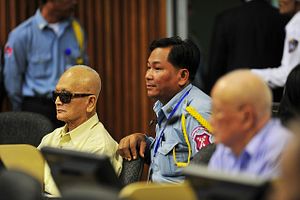Charges of genocide have been pressed against surviving leaders of the Khmer Rouge by prosecutors at the Extraordinary Chambers in the Courts of Cambodia (ECCC) as the tribunal enters its eighth year with further prosecutions in sight.
The charges relate to the deaths of 20,000 ethnic Vietnamese and at least 90,000 Muslim Chams, allegedly slaughtered after Pol Pot took control of Cambodia in April 1975. Up to 2.2 million people would perish under his bloody rule over the next three years and eight months.
This is third trial to date and the second for chief Khmer Rouge ideologue Nuon Chea, 88, and its former head of state Khieu Samphan, 83. The court will next week hand down its verdict against both men, who have already been tried on charges of crimes against humanity.
Prosecutors had the charges split amid fears a single trial covering both charges would take too long, raising the prospect that both men would die before a verdict could be reached.
Genocide is a sensitive subject here. Cambodians have long since used the term to describe the atrocities committed by the Khmer Rouge; however, some experts have argued that the Cambodian definition of the word may not fit the legal meaning.
The United Nations defines genocide as “acts committed with intent to destroy, in whole or in part, a national, ethnic, racial or religious group.” Some have suggested that justice should lie with the crimes committed as opposed to their classification.
“If anything, the Khmer Rouge exceeded the definition of genocide,” says Peter Maguire, an academic, authority on the Khmer Rouge Tribunal, and author of Law & War. “Obviously their persecution of the Vietnamese, Cham Muslims, and Buddhist monks were acts of genocide.”
“However, the vast majority of their atrocities were carried out against fellow Cambodians. At the end of the day these academic debates do not change the fact that the KR committed some of the most brutal atrocities of the 20th century,” he said.
Most of the initial arguments in Case 002/02 centered around the introduction of evidence from Cases 001 – resulting in the jailing for life of a death camp commandant – and 002/01, the initial case brought against Nuon Chea, Khieu Samphan, and the former foreign minister Ieng Sary and his wife Ieng Thirith.
Ieng Sary died recently while Ieng Thirith has been ruled mentally unfit for trial.
“My task is a difficult one.” said Khieu Samphan’s lawyer, Anta Guisse.
Prosecutors and defense also argued over whether potential witnesses currently in government should be allowed to testify.
More than 250,000 Cambodians have witnessed proceedings at the ECCC from the public gallery of the tribunal, which has so far cost more than $200 million – or about $100 for each person who died while the Khmer Rouge were in power.
“I think that case of Vietnamese genocide will be easily made. Khmer Rouge atrocities against the Vietnamese have been conspicuously absent from the ECCC,” Maguire said.
“Why have the Vietnamese ignored the crimes committed against their civilians, the same crimes they used as grounds to overthrow the KR regime? Vietnam occupied Cambodia for almost a decade, why the arms length relationship with the tribunal?
“Nobody knows more about the Khmer Rouge but until 2014, the UN tribunal had no Vietnamese interpreters, translators, or investigators,” he noted.
Legal wrangling over witness lists and the inclusion of evidence from pervious trials could delay further hearings. The court has said it would like to proceed in the last quarter of this year but defense counsels have argued they might not be ready until 2015.
Luke Hunt can be followed on Twitter @lukeanthonyhunt

































